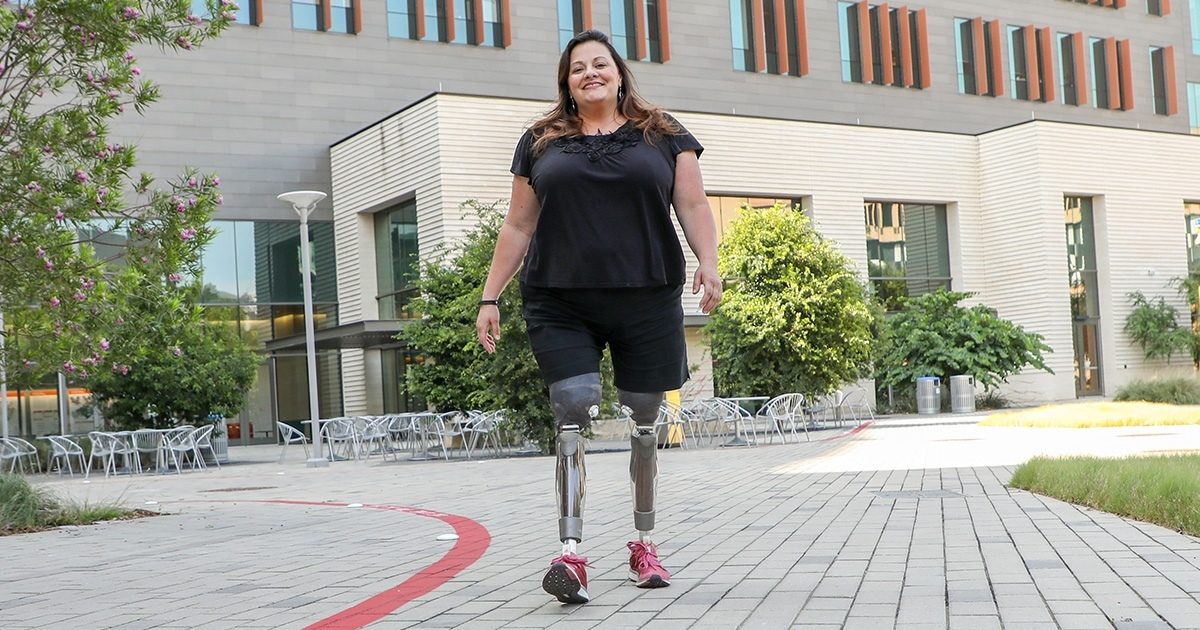“There’s Nothing I Can’t Do.”
How a UT Health Austin Patient Overcame A Bilateral Amputation
Reviewed by: Anthony Johnson, MD
Written by: Abbi Havens

Heather had never skied down a mountain before. In fact, she had never worn skis at all. So it came as quite a surprise to Heather when she found herself in skis for the first time at the top of a mountain, as a bilateral above-knee amputee. But her journey to the top was far from easy.
12 years ago, Heather was involved in a minor car accident in rush-hour traffic on the highway. She and the other party pulled over and Heather hopped out of her car to routinely exchange insurance information. In a split second that would change everything, a third car swerved straight for her.
“When the dust settled, I started to look around. I saw something in front of me and realized, that’s my sock. And… that’s my shoe. My eyes continued to follow the trail. That’s my leg. An off-duty firefighter who was stuck in traffic saved my life. I was aware the whole time. When the paramedics arrived, I was coherent enough to tell them my emergency contact information and I was transported to the hospital in minutes. I am a very, very lucky person. I’m just happy to be here and happy to be alive.”
A reputation for excellence
As a bilateral above-knee amputee (removal of both limbs above the knee) Heather’s circumstances are unique. Of the 185,000 amputations that occur in the U.S. each year, approximately 11 percent are bilateral above knee amputations. Of those 11 percent, very few are able to walk again. In order to get where she needed to be, Heather knew she required an extraordinary provider with a specialized skillset. She chose UT Health Austin specifically for Anthony “AJ” Johnson, M.D. and Clinical Director of Sports and Injury at the Musculoskeletal Institute. During Dr. Johnson’s 28-year-long military career, he specialized in treating injured war veterans, including countless amputees.
“There’s so much I want to achieve, and Dr. Johnson has a reputation in the amputee community in Austin of making things happen,” says Heather. “His history at the Center for the Intrepid and his military experience has prepared him for anything. His enthusiasm for his work and my enthusiasm as a bilateral above-knee amputee made us a perfect match. I knew Dr. Johnson could get me where I wanted to be.”
The feeling was mutual.
A patient advocate at Austin Prosthetics Center, an amputee herself who has worked with Dr. Johnson, connected the two when Heather suffered a sports injury.
“Heather had faced a few setbacks when she first came in,” says Dr. Johnson. “Because she is a bilateral above-knee amputee, in order to clear the ground with a running prosthetic, she must lift the prosthetic out and back around in a circular motion using her residual limb. While doing so at a running clinic, she tore her abductors. Now Heather’s goal is to get back in the game as soon as possible. Her first visit with me was to gain her trust, the second was for me to prove I know what I’m doing, and now she’s one of our own.”
The difference in Dr. Johnson’s care according to Heather? Respect.
“When I take my sockets off, people tend to baby me. They want to help me and make things easier for me, but that doesn’t allow me to grow,” says Heather. “Dr. Johnson treats me like an athlete. When I first removed my sockets off during our visit, I was nervous. My legs didn’t look pretty. He just said, ‘Yes, that’s what it looks like to be a high-activity prosthetics user!’ AJ knows his patients on a personal level (in fact, we call him by his first name) and he understands what’s best for them. He and his patients are going to flourish at UT Health Austin.”
Care beyond the clinic
Dr. Johnson’s support for his patients doesn’t end in the care room. Heather says fondly that each time she tells Dr. Johnson she’s participating in an activity or sport, he wants to know when and where. He’ll be there to cheer her on.
Heather and Dr. Johnson are working together to help Heather become comfortable and excel as a runner. According to Dr. Johnson, for most adaptive athletes, learning to run is a means-to-an-end and the foundation for almost any sport. This is especially important for Heather, who now organizes a group called ATX Amputees.
“I want to do everything. If there is a way for adaptive athletes to participate and someone who is skilled in training adaptive athletes present, I’m there,” Heather says. “ATX Amputees is about spreading this ambition to others like me and making dreams possible. We introduce people to new things, whether it’s rock climbing, running, skiing, you name it, we help them find new passions.”
According to Heather, sports and activity are critical to growth and adaptation as an amputee.
“There is never a feeling of comfort walking around on two prosthetic legs,” says Heather. “It’s about always being scared, but pushing through the fear anyway. It’s what makes me feel alive.”
At UT Health Austin, we’re here to help you achieve what matters most to you. Whether that’s skiing down a mountain, running a marathon or just learning to walk again, Dr. Johnson never says, “You can’t do that.” Instead, “If you’re going to do that, here’s what we can to do to get you there.”
If you or a loved one are interested in contacting ATX Amputees, you can reach them by sending a direct message to their Facebook page.
To learn more about the Sports and Injury Clinic part of UT Health Austin’s Musculoskeletal Institute or to make an appointment, visit here or call 1-833-UT-CARES.